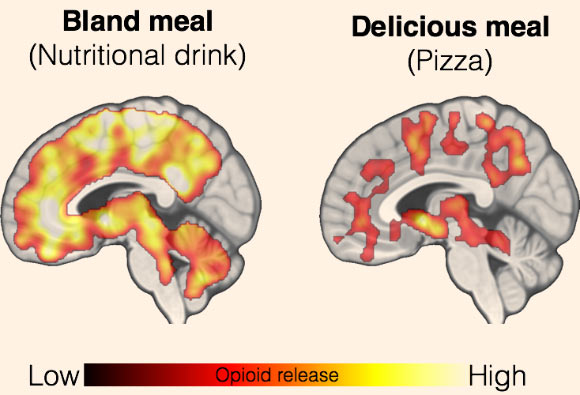A recent study conducted at the University of Turku, Finland, has revealed that eating leads to the widespread opioid release in the human brain, likely signaling feelings of satiety and pleasure. The research is published in the Journal of Neuroscience.

Eating both bland (left panel) and delicious (right panel) meals triggered significant opioid release in the brain. Image credit: University of Turku.
Professor Lauri Nummenmaa and co-authors used positron emission tomography (PET) to test whether eating triggers the release of the body’s own opioids, called endorphins, and whether this response is associated with pleasant feelings.
The participants were injected with a radioactive compound binding to their brain’s opioid receptors.
Radioactivity in the brain was measured three times with the PET camera: after a palatable meal (pizza), after a non-palatable meal (nutritional drink) and after an overnight fast.
“Opioids are associated with pleasure and euphoria,” Professor Nummenmaa and colleagues said.
“Our study revealed that a significant amount of endorphins is released in the entire brain after eating the pizza and, surprisingly, even more are released after the consumption of the tasteless nutritional drink.”
“The magnitude of the opioid release was independent of the pleasure associated with eating.”
It’s likely that the endogenous opioid system regulates both feelings of pleasure and satiety, according to the team.
“The opioid system regulates eating and appetite, and we have previously found that its dysfunctions are a hallmark of morbid obesity,” Professor Nummenmaa said.
“The present results suggest that overeating may continuously overstimulate the opioid system, thus directly contributing to development of obesity.”
“These findings open new opportunities for treating overeating and the development of obesity.”
“It was a surprise that endorphins are released in the entire brain and that the nutritional drink had a larger impact,” added Dr. Jetro Tuulari, first author of the study.
“This creates a basis for future research and hopefully we will find ways to study and describe the development and predictors of addiction, obesity and eating disorders.”
_____
Jetro J. Tuulari et al. 2017. Feeding Releases Endogenous Opioids in Humans. Journal of Neuroscience 37 (34): 8284-8291; doi: 10.1523/JNEUROSCI.0976-17.2017







